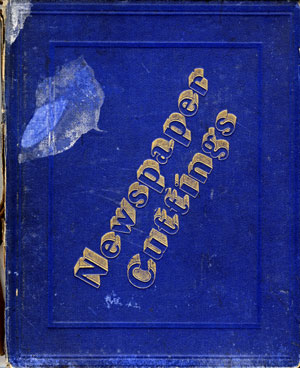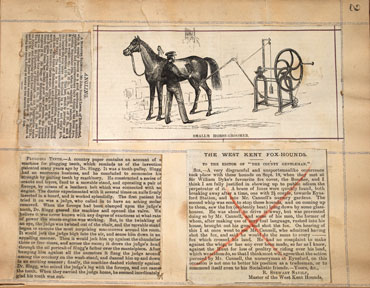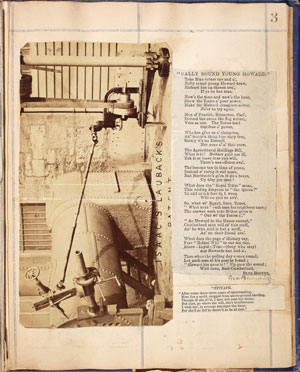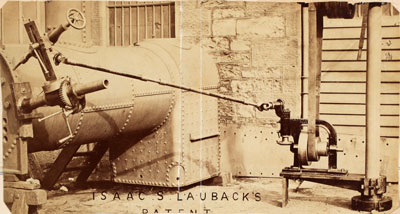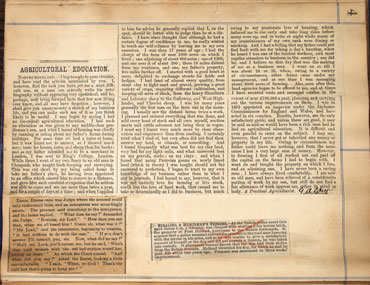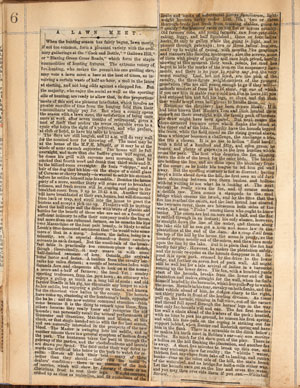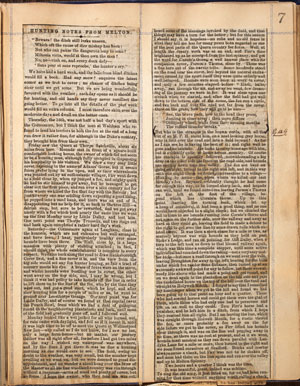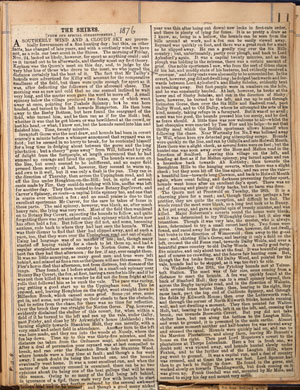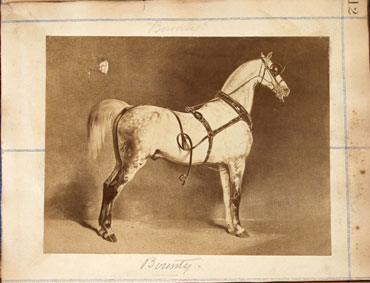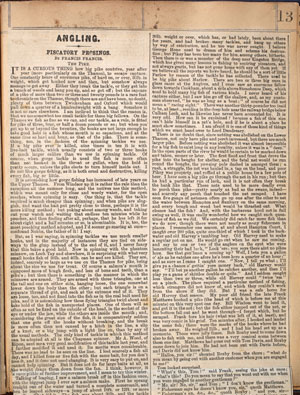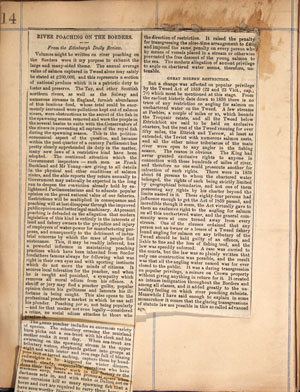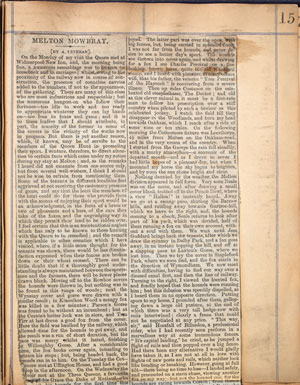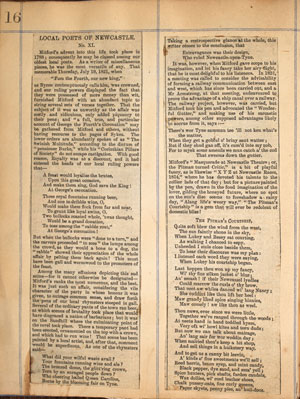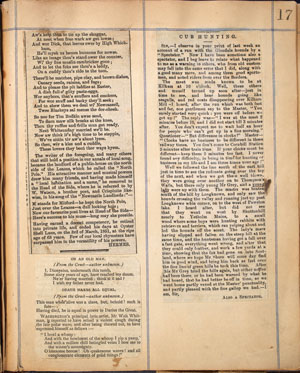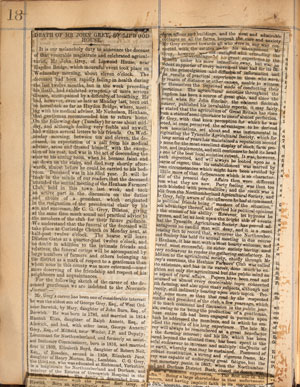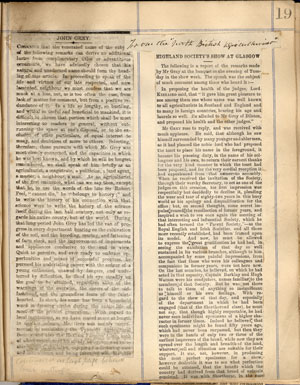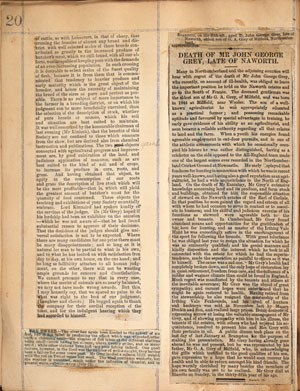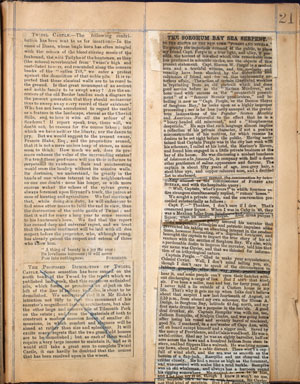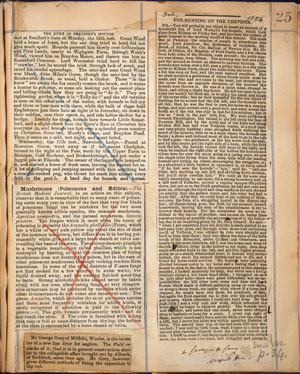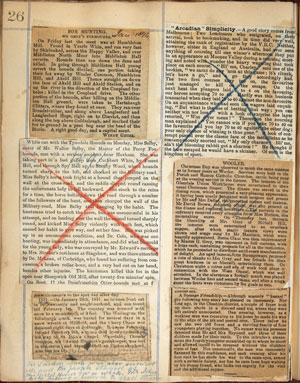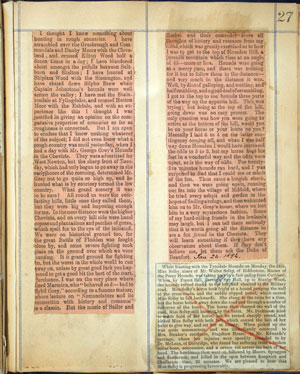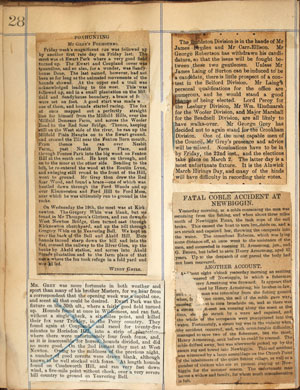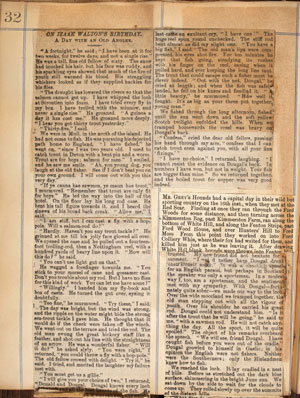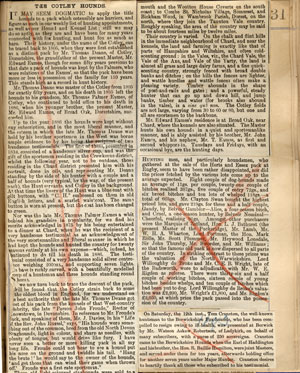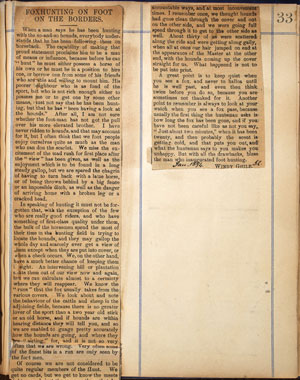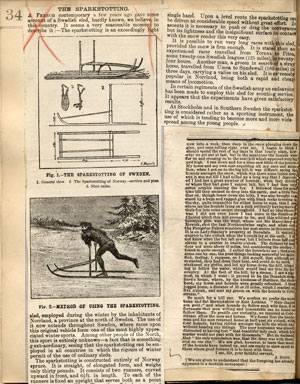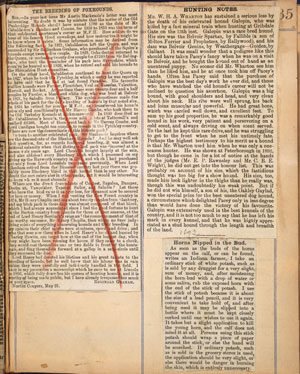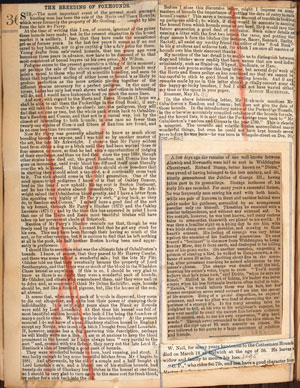

Articles on this page: West Kent Foxhounds, (shooting a fox), Polishing Pebbles, The Lough Conn Pike, The Floral Fancies of Tench, Hunting Mr Greys Foxhounds and Milfield.
HUNTING. MR. GREY’S FOXHOUNDS. On Friday last the meet was at Humbleton Mill. Found in Yearle Whin, and ran very fast by Skirlnaked, across the Happy Valley, and over Middelton North Moor into Middleton Hall coverts. Hounds then ran down the dene and killed. In going through Middleton Hall young covert the hounds divided, one portion taking their fox away by Wooler Common, Humbleton Hill and Akeld Hill. Thence straight on down the face of Akeld Hill to Akeld Station, and on up the river in the direction of the Coupland foxholes; killed in the Coupland Drive. The other portion of the hounds, after killing on the Middleton Hall ground, were taken to Hartsheugh Glitters, where they found at once. They ran over Broadstruther, and along above Langleeford and Langlee Hope, right on to Cheviot, and then along the top above Goldscleugh, and marked their fox to ground in a peat bog near the head of the Bizzle. A right good day, and a capital scent. WINDY GHILE
M I L F I E L D READING ROOM BALL June 1894. -On Friday evening last a ball was held in connection with and in aid of the funds of the Reading Room. The company, consisting of upwards of 45 couples, assembled in the Schoolroom, which was suitably arranged for the purpose by the Committee, to whom every credit is due for making and carrying out the necessary arrangements for the entertainment. Dancing was commenced about 9 o'clock with the " Triumph," which was led off by Mr W. Fleming and Miss Mossman; and it was kept up with unflagging zeal until 4 o'clock in the morning. Songs were given at intervals, and also the “Highland Fling" by gentlemen of the company. A liberal quantity of refreshments were supplied by the Committee, and the requirements of the large company were attentively catered for by the following ladies and gentlemen: - Messrs Affleck, Henderson, Tarbit, and Misses Tunnah, Atkinson, and Conneil. The music was supplied by Messrs Robt. Morton and Fettis, Wooler, and it gave every satisfaction. The duties of M. C. were creditably discharged by Mr W. Fleming. The takings amounted to a little over £8.
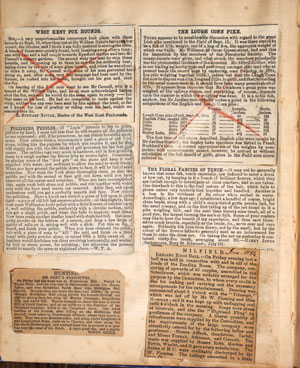
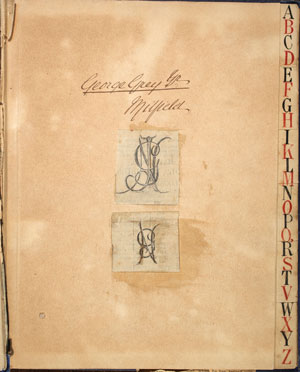

1. Four poems or songs: Lilly’s goodnight, Romance, Looking Back, Song.
Article about good fishing lakes near Goteborg prefaced by initials G.G. You would find one or other of the following places on Lake Wenern convenient: Karlstad, Wenersberg, Mariestad, Lidkoping or Arnal. At either of these towns fair accommodation can be had; they are easily reached from Göteborg, and good trout fishing is to be had within a reasonable distance. At Kongelf, about twelve miles from Göteborg, there is a comfortable inn; trout, pike, and perch fishing.
Scrapbook belonging to George Grey and his son John Neil Grey. Most cuttings date from the 1890s with some from the early 1860s and the 1870s.
2. Line illustration of Smalls Horse Groomer. West Kent Fox Hounds. (shooting a Fox) Plugging teeth( anecdote about Dr Sluggs steam tooth puller) Angling ( A monster salmon)
3. Isaacs Lauback's patent (engine), Political poem “Rally Round Young Howard”by Geo Bowmaker. Epitaph to a scold
4. “Agricultural Education” by G. A. Grey, Joke about translating Irish, Stealing a Huntsman’s terrier (Bedale Foxhounds)
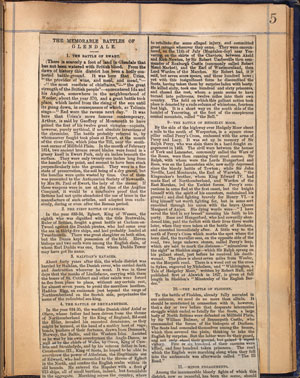
"AGRICULTURAL EDUCATION Northumberland- I beg to reply to your circular and have read the articles mentioned by you. I however, find the task you have set me a most difficult one, as a man can scarcely write his autobiography without appearing very egoistical, and he, perhaps, may bring forward facts that few now living ever knew, and all may have forgotten; however I shall give you anonymously, a sketch of my business life, and you can make such use of it as you think likely to be useful. I may begin by saying that I had no (so called) agricultural education. I has such an education as was given to any middle class gentleman’s son, and what I learned of farming was chiefly by running or riding about my father’s farms during holidays. For some time we had a tutor at home, but it was found not to answer, as I showed much more taste for horses, cows, and sheep than books; and as my father intended me to be a merchant in London, I was sent to Kings College, London. While there I went of my own fancy to an old man in Cheapside who taught bookkeeping and surveying. This was cut short by my being called home to take my father’s place, he having been appointed to an office which caused him to remove to a distance, and gave him such constant occupation that he seldom was able to come and see me more than twice a year, and for a couple of days at a time; and when I applied to him for advice he generally replied that I, on the spot, should be better able to judge than he at a distance. I have since thought that although he had a certain degree of confidence in me, he really wished to teach me self-reliance by leaving me to my own resources. I was then 17 years of age; I had the charge of a farm of near 1000 acres on which I lived; one adjoining of about 600 acres; one of 1200, and one near it of about 500; these 10 miles distant from my residence, and one my father’s property, five miles further off. I started with good heart at once, delighted to exchange streets for fields and hedges. I had land of almost every quality, from stout clay to light sand and gravel, growing a great variety of crops, requiring different cultivation, and keeping all sorts of stock, from the heavy Shorthorn and Leicester sheep to the Galloway and West highlander and Cheviot sheep. I was for many years the first man on the farm out in the morning. I usually saw the distant farms twice a week. I planned and ordered everything that was done, and sold every head of stock and all corn myself, auction marts and cattle salesmen then not being in vogue. I must say that I learned more by close observation and experience than from reading. I certainly tried what I read of, but very often did not find them answer my land, climate or something. And I found very frequently what was best for my clay land, very bad for my light soils, and what answered best on my gravels, useless on my clays: and when I found that using Peruvian guano on newly limed land (which in theory I was taught should not be) answered to perfection, I began to trust my own knowledge of my business rather than what I saw in journals. I feel bound to say however, that it was not entirely love for farming or live stock, much less the love of hard work, that caused me to take so determinedly as I did to business, but much owning to my passionate love of hunting, which induced me to rise early and take long rides before many were up, and to write at night while many of my acquaintances of my own rank were dining or smoking. And I had a feeling that my father could not find fault with me for taking a day’s hunting, when he heard I was one of the hardest workers, and most regular attenders to business in the country; nor did he, and I believe to this day that was the making of me as a business man. I went on so till I was about 24 or 25, when owing to a variety of circumstances, other farms came under my management, and at one time I was managing about 8000 acres of farming. Also soon after this land agencies began to be offered to me, and at times I have received rents and managed estates to the extent of near £100,000 a year, planning and carrying out the various improvements on them. I was in 1853 appointed as inspector under the Inclosure Commissions for England and Wales, and have acted in 6 counties. Results, however, are the only satisfactory guide, and unless these are good, it may be said that so and so would have been a rich man had he had an agricultural education. It is difficult and painful to enter on the subject. I may say however that I never got or inherited any money or any property in my life. Owing to circumstances my father could leave me nothing, and from the same cause I lost a very large sum of money. However in farming I first of all worked out and paid off the capital on the farms I had to begin with. I went on and bought the property on which I live, and an adjoining one. I have never been a saving man; I have always lived comfortably. I am now an old man, and have been relieved of a considerable portion of my work by my son, but still do not find a fair allowance of work oppress me, either in mind or body. A Practical agriculturalist." "G. A. Grey."
5. The Memorable battles of Glendale 12 are described: 1. The Battle of Ewart, 2. The Battle of Carham, 3. Halfdan's Ravages, 4. The Battle of Brunanburgh,5. The Second Battle of Carham, 6. The Third battle of Carham, 7. The Battle of Nesbit and Homildon Hill, 8. The Battle of Yeavering, 9.The Battle of Hedgeley Moor, 10. The Battle of Flodden, 11. Minor Engagements, 12. The Battle of Chevy Chase.
6. A Lawn Meet ( General description from Whitehall Review) unsigned.
7. Hunting Notes from Melton. Quorn at Thorpe Satchville. " But who is the stranger in the brown cords, with all the cut of an M. F. H. about him, on a neat looking grey horse, who is first over the road and into the field beyond? As far as I can see he is having the best of it; and right well he goes and no mistake. He looks to carry some age with him, but is evidently quite at home across country." Annotated with G.A.G. in margin. (Continues on page 8)
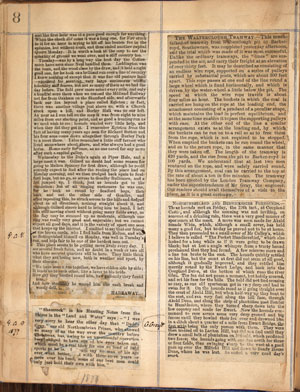
8. Cont form page 7. G.A.G. Grey unsuccessful eye operation 1877, The Waterclough Tramway, Berwickshire Foxhounds meet at Coupland Castle. (G. Grey mentioned at Milfield.)
THE WALTERCLOUGH TRAMWAY. – This much talked of tramway from Waterclough pit to Barker-royd, Southowram, was completed yesterday afternoon, and the trial which was made of it was most successful. Unlike the ordinary tramways, the "lines" are suspended in the air, and carry their freight at an elevation of over thirty feet. It may be described as consisting of an endless wire rope, supported on a series of pulleys carried by substantial posts, which are about 300 feet apart. This rope passes at one end of the line round a large wheel which is fixed horizontally, and which is driven by the water-wheel a little below the pit. The speed at which the wire rope travels is about four miles an hour. The buckets in which the coal is carried are hung on the rope at the loading end, the attachment consisting of a pendant of a peculiar shape, which maintains the load in perfect equilibrium, and at the same time enables it to pass the supporting pulleys with ease. At the other end of the line a similar arrangement exists as at the loading end, by which the buckets can be run on to a rail so as to free them from the rope, which is not required to be stopped. When emptied the buckets can be run round the wheel, and on to the return rope, in the same manner that they were taken off. The length of the tramway is 420 yards, and the rise from the pit to Barker-royd is 100 yards. We understand that at last two men ventured on the rope, and was safely carried round. By this arrangement, coal can be carried to the top at the rate of about a ton in five minutes. The tramway has been erected by the London Tramway Company, under the superintendence of Mr Gray, the engineer. Our readers should avail themselves of a visit to the place as it is a great curiosity.
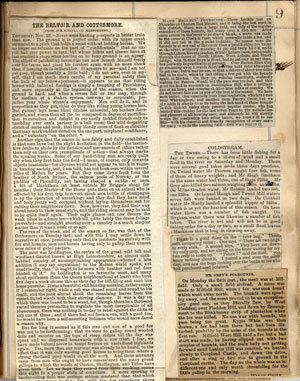
9. The Belvoir and Cottesmore at Loddington ( including a little poem about G.A.G. on old grey mare on back), Major Brown's Foxhounds meet at Chatton Red Houses ( G.G. in margin), Coldstream Fishing in the Tweed, Mr Grey killed two salmon weighing 25 lbs. and 20 lbs., Joke about Potato Bug.
The Belvoir and Cottesmore from THE FIELD extract: -we do like a jump or two when our horses are fresh, the turf honest, the fences fair, and hounds running as they can only run over the grass. The impression must not, however, be given that there was absolutely no fencing in this run-for it was obvious that one fine old sportsman, who had travelled far to witness this, and has been paying us a visit from the county whose capital is “bonnie Newcastle,” had succeeded in finding at least one bullfinch. He is ever to be seen pushing to the front as keenly as, but a thousand times more cleverly than, an Oxford undergraduate, and to-day he carried away the proof in a feature scarred and crossed like nothing but a newly fired fore-leg (if he will forgive the simile). But it was in the Quorn run of the previous day that he was to be seen to best advantage, when throughout there could be but one opinion, viz.,
That the first in the van
Was that old grey man
Who rode on the old grey mare.
G.A.G.
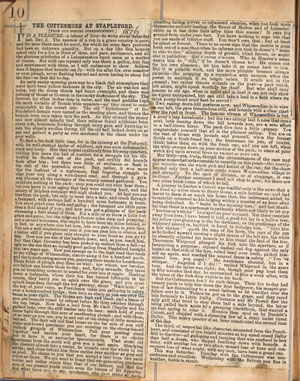
10. The Cottesmore at Stapleford. 1876 ( G.A.G. mentioned)
11. The Shires 1876 Quorn at Keyham
.. .the number who really saw the run throughout was most select. Amongst those who did were Tom Firr (whose horse came to grief in the first brook). The master, a gentleman from a distance (whose name I have not caught, and who went in really good style to day, as he did also last Monday), Sir Beaumont and Lady Florence Dixie, Mr Ernest Paget…….G.A.G.
12. Photograph of horse called Bounty.
13. Angling by Francis Francis The Pike
14. River poaching on the Borders. (possibly abt. 1876)
15. Melton Mowbray. Quorn met at Widmerpool New Inn. From The Daily Telegraph. Thursday 20 December. (N.B.War news from Mramor on the reverse would date this to between 1876-8.The Serbo-Turkish War)
16. Local poets of Newcastle. No XI. Mitford. ( cont. on to page 17)
17. two poems translated from Greek. Cub Hunting. Letter about Glendale hounds meet mentions different clocks times and young Mr. Grey
18. Death of Mr John Grey of Lipwood House (John Grey died on 22 January 1868 )
19. John Grey Obituary. Highland Society show at Glasgow Speech by Mr Gray at banquet (continued page 20)
20. The Tweed Floods Mr Grey catches 12 and half pound salmon. Death of Mr John George Grey of Naworth. Obit of Mr. John George Grey of Naworth.( George Annet Grey's eldest son and died on 30 March 1879 at the age of 35 at Biarritz.)
21. Protest against demolition of Twizel castle ( partly demolished early 1880s) Demolition of Tilmouth Park The Soghum Bay Sea Serpent. Capt. Slocum W. Porgie.
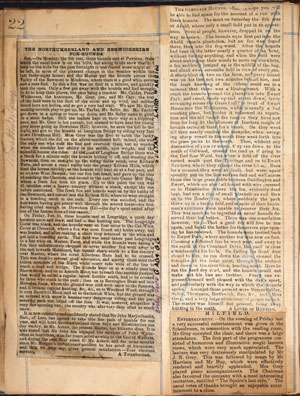
22.The Northumberland and Berwickshire Foxhounds meet at Pawston signed A Tweedsider. ( GAG and GG & Miss H. M. Grey in margin with names of horses: Sultan, Laird and Warrier. H. M Grey possibly Hannah Mary ,George Annett Grey's daughter who later married Ralph Hart Tweedell.) "Miss Grey was the first to catch the lucky leaders..indeed she was the only one who rode the line, and overtook them, but no wonder when we consider her ability in the saddle, nice weight and the splendid hunter she rides.." The Glendale Hounds signed by A Lover of Hunting.
MILFIELD ENTERTAINMENT—On the evening of Friday last a very successful entertainment was given in the Schoolroom, in connection with the reading room. Mr Grey occupied the chair, and there was a large attendance. The first part of the programme consisted of humorous and illustrative magic lantern views, which were very much appreciated. The lantern was very dexterously manipulated by Mr J. N. Grey. This was followed by songs by Mr Harrison and Mr Hay, which were effectively rendered and heartily applauded. Mrs Grey played piano accompaniments. The Chairman also favoured the company with a most interesting recitation, entitled “The Squire’s last ride.” The usual votes of thanks brought an enjoyable entertainment to a close.
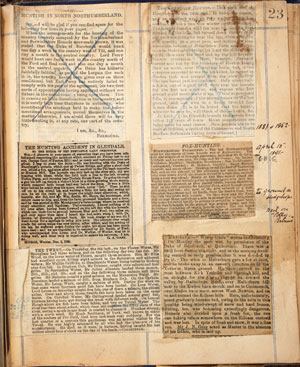
23. Hunting In North Northumberland ( criticism of Earl Percy), signed Foxhound.
The Hunting Accident in Glendale 1880, To the Editor of the Newcastle Chronicle written by G.A.G. about his son George Grey of Fenton Hill. .."In going through a gap his left leg struck a a violent blow in a thick growing thorne stump, which snapped both bones half way below the knee. It was a little time before he could stop his mare which never fell. Then he slid off onto his sound leg, and waiting for help, and seeing no one, he let the mare go in hopes she might draw attention, which happily she did, and Mr Wm. Smith, Mr Shore the huntsman, and others came to him, and from the farm procured blankets and a door, and he was carried to Miss Montgomery's farmhouse where he received every attention and kindness. Unfortunately I knew nothing of it until long after, having been forward on the left line with the hounds,which ran their fox to ground between Etal and Ford, two miles on, and only some time later I heard the bad news, when I with Dr. Brown of Berwick galloped back. He took charge of my son till I went home for a carriage to bring him here. The journey over rough ground for seven miles was very trying, after which and the setting of his leg, he suffered much during the night, but since has been much more easy: and we are thankful to be assured by Dr Smith, of Ford, who accompanied him home, and Dr Walker of Wooler, that he is doing well, and time only is required to secure his recovery. - I am etc. G. A. Grey. Milfield, Wooler, Dec. 5 1880.
The Tweed Salmon Fishing (G.G. 22 lbs, 20 lbs.)
The Glendale Hounds meet at Humbledon. "The Glendage Hounds this season have killed 12 ½ brace of foxes. Great preparations are being made for next season. New kennels are to built at Milfield, a draft of the Cottesmere and South Durham foxhounds having been obtained "1881 or 1882
Fox Hunting, Berwickshire Foxhounds. "Mr Grey with his two sons Mr John and Mr George" G.H.I.G. April 15, 1891. "Two lucky young sportsmen on well bred ponies were all through the run" added note Neil on "Polly Perkins"
Mr Greys meet by permission of Duke of Buccleuch at Halterburn. Chronicle "J.N.Grey acted as master in the absense of his father who is laid up")
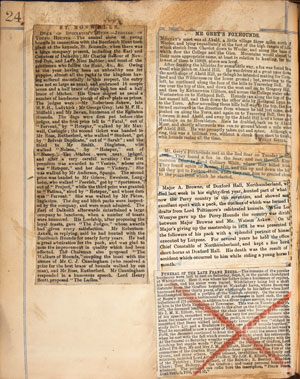
24. St. Boswells Duke of Buccleuch’s hunt. Judging of young hounds. Mr George Grey late M.F.H., Milfield one of judges. Mr Greys Foxhounds meet at Akeld. Mr Greys Foxhounds meet at Redscar. Major Brown of Doxford hall obit. Death in riding accident. Funeral of late Frank Beers Sept 5th 1894, popular huntsman
25.The Duke of Beauforts Hounds met at Swalletts Gate. Mushrooms Poisonous and Edible. Mr George Grey of Milfield is the inventor of a new line drier for anglers. Foxhunting on the Cheviots. Account of Lord Wemys Fox hounds in 1854 meet at Pawston including account by G. A. Grey (article continues on page 34)
26. Foxhunting Mr Greys Foxhounds Jan 1894. Meet at Humbleton Hill Tynedale Hounds. 1894 Miss Selby in serious accident. Jan 28th 1831 An intense frost Edinburgh coach buried in snow at Milfield (added writing) Arcadian simplicity. Hare coursing in Australia ( joke) Wooler Christmas Day 1894 (Mrs Grey of Milfield, Hill magic lantern slides, Santa Clause impersonated by Master G. Grey) A strange friendship. (Making friends with fox cub.)
27. Day with Mr George Grey's hounds in the Cheviots.(on pink paper Jan 24 1894. ) Very rough country and hard to find foxes). Tynedale Hounds Miss Selbys accident. 1894.
28. Foxhunting Mr Greys Foxhounds at Ewart Park Ewart Park on 30th. Council Elections. (Mr Grey will not stand again for Crookham division) Fatal Coble Accident at Newbiggin. Death of Henry Armstrong.
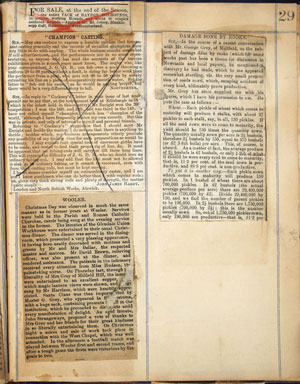
29. For sale entire pack of Haydon hounds by Joicey, Blenkinsop Hall Haltwhistle. Champian Casting: tournaments have little to do with angling, by John James Hardy. Wooler Christmas Mrs Grey etc. ( as page 26) Damage done by Rooks (correspondenc referring to Mr Greys letter about proportions of weed sown which are productive.)
DAMAGE DONE BY ROOKS SIR,-In the course of a recent conversation with Mr. George Grey, of Millfield, on the subject of damage done by rooks (which for some weeks past has been a theme for discussion in Newcastle and local papers), he mentioned a discovery he had made, which to me appeared somewhat startling, viz. the very small proportion of seeds sown, which, escaping accident of every kind, ultimately prove productive. Mr. Grey has since supplied me with his figures, which I have his permission to use. He puts the case as follows:- Wheat.-Each pickle of wheat which comes to maturity will produce 4 stalks, with about 37 pickles to each stalk, say, in all, 150 pickles. If all the seed sown were to come to maturity, the yield would be 150 times the quantity sown. The quantity usually sown per acre is 2 ½ bushels, therefore 2 ½ bushels by 150, equal to 375 bushels, (or 62 3-6th bolls) per acre. This, of course, is absurd. As a matter of fact, the average produce of 2 ½ bushels is 42 bushels, or only 1-9th of what it should be were every seed to come to maturity, that is 11.2 per cent. of the seed sown is productive, and 88.8 per cent. is non-productive. To put it in another way.- Each pickle sown which comes to maturity will produce 150 pickles. In one bushel of wheat there are about 700,000 pickles. In 42 bushels (the average produce per acre) there are 29,400,000 pickles (700,000 by 42). Divide 29,400,000 by 150, and we find the number of parent pickles to be 196,000. In 2 ½ bushels there are 1.750,000 pickles (700,000 by 2 ½); this is the number usually sown. So, out of 1,750,000 pickles sown, only 196,000 are productive-that is 11.2 per cent.
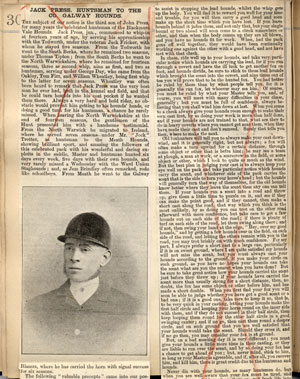
30. Jack Press. Huntsman for Co Galway hounds, and notes on hounds and hunting by John Press his father.
31. The Cotley Hounds, History Sales of Herts and Essex hounds at Rugby disappointment with prices fetched. Tom Cranston of Berwickshire foxhounds, retirement.
32. A day with an Old Angler, narrative about trout fishing in Scotland. Mr Greys hounds Red Scar.
MR GREY’S Hounds had a capital day in their wild but sporting country on the 16th inst., when they met at the Red Scar. Finding at once they ran through the Ford Woods for some distance, and then turning across the Kimmerston Bog, past Kimmerston Farm, ran along the bottom of White Hill, and along the Fenton Strips, past Ford Wood House, and over Hunter’s Hill to Ford Moss. From this point they worked on into Ford Colliery Whin, where their fox had waited for them, and killed him just as he was leaving it. After drawing White Hill blank hounds were thrown into Fenton Hill……
33. Hunting on Foot on the borders Jan 1894 byline Windy Ghile ( initialled ?JC)
34. The Sparkstotting Two Engravings and description of Swedish sledge. (rest of article from page 25)
35. The Breeding of Foxhounds by Reginald Graham. Hunting Notes. Death of rare breed hound called Galopin killed by train owned by Mr Wharton dated 1893. Horns Nipped in the Bud. (Using potash on calves horn buds.)
36.The Breeding of Foxhounds 1894 by Austin Mackenzie. Richard Stamp, farmer funeral. W Neil, huntsmen with Cottesmore died at Dulwich 1895
W. Neil, for many years huntsman to the Cottesmore Hounds died on March 18th at Dulwich at the age of 58. He leaves a widow and family to mourn his loss. 1895
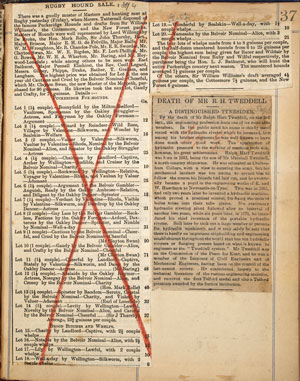
37. Rugby hound sale 1894. 20 lots, pedigrees listed. Death of Mr R. H. Tweddell. Engineer 1895 Inventor of hydraulic riveter. Obituary Educated at Cheltenham. (Hannah Mary Grey , George Annett Grey's daughter married Ralph Hart Tweddell on 2 Aug 1875. He died on 3 Sep 1895.)
DEATH OF MR R. H. TWEDDEL A DISTINGUISHED TYNESIDER. By the death of Mr Ralph Hart Tweddell, on the 3rd inst., the engineering profession loses one of its most able members. In the public mind his name is chiefly associated with the hydraulic riveter which he invented, but among his brother engineers he was well known to have done much other good work. The application of hydraulic pressure to the working of machine tools was, however, his great achievement. Ralph Hart Tweddell was born in 1843, being the son of Mr Marshall Tweddell, a north- country shipowner. He was educated at Cheltenham College, with a view to entering the army, but his mechanical instinct was too strong to permit him to follow the course his friends had laid out, and he eventually became a pupil in the engineering works of R. and W. Hawthorne at Newcastle-on-Tyne. This was in 1861, and only two years later he invented a hydraulic machine, which proved a practical success, for fixing the ends of boiler tubes into their tube plates. His stationary hydraulic riveting plant followed after an interval of another two years, while six years later, in 1871, he introduced his chief invention of the portable hydraulic riveter. Still later he took out a large number of patents for hydraulic machinery, and it may safely be said that there is hardly an important shipbuilding and engineering establishment throughout the world that has not hydraulic riveters or flanging presses based on what is known to engineers as the "Tweddell system." Mr Tweddell was on the Commission of the Peace for Kent, and he was a member of the Institute of Civil Engineers and of Mechanical Engineers, having been on the council of the last-named society. He contributed largely to the mechanical literature of the various engineering societies, and received the first Telford medal and also a Telford premium awarded by the former institution.
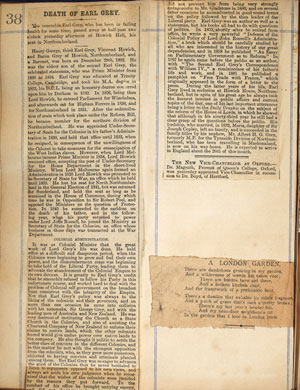
38. Death of Earl Grey.( Henry The third Earl died on 9 October 1894, aged 91.) Poem about London garden. (Inserted between these 2 pages a list of otter hound packs in UK during 1893)
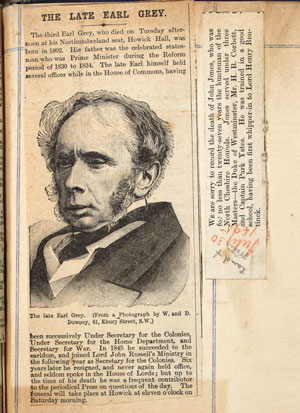
39. The late Earl Grey (with portrait engraving) Death of John Jones huntsmen with North Cheshire July 30 1895
THE LATE EARL GREY The third Earl Grey, who died on Tuesday afternoon at his Northumberland seat, Howick Hall, was born in 1802. His father was the celebrated statesman who was Prime Minister during the Reform period of 1830 to 1834. The late Earl himself held several offices while in the House of Commons, having been successively Under Secretary for the Colonies, Under Secretary for the Home Department, and Secretary for War. In 1845 he succeeded to the earldom, and joined Lord John Russell’s Ministry in the following year as Secretary for the Colonies. Six years later he resigned, and never again held office, and seldom spoke in the House of Lords; but up to the time of his death he was a frequent contributor to the periodical Press on questions of the day. The funeral will take place at Howick at eleven o’clock on Saturday morning.
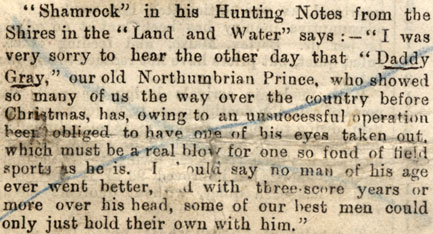
G. A. G. 1877 "Shamrock" in his Hunting Notes from the Shires in the "Land and Water" says: – "I was very sorry to hear the other day that "Daddy Gray" our old Northumbrian Prince, who showed so many of us the way over the country before Christmas, has, owing to an unsuccessful operation been obliged to have one of his eyes taken out, which must be a real blow for one so fond of field sports as he is. I should say no man of his age ever went better, and with three-score years or more over his head, some of our best men could only just hold their own with him."
NORTHUMBERLAND AND BERWICKSHIRE FOXHOUNDS. – These hounds met on Friday, the 19th inst., at Coupland Castle, and although the morning was not inviting, on account of a drizzling rain, there was a very good muster of sportsmen at the meet. A move was soon made for Akeld Steads Whin, which, although a small, cover, has held many a good fox, but to-day he proved not to be at home. They then proceeded to a small cover of Mr Culley’s, which I believe is called "The Pocket Handkerchief," which also looked for a long while as if it were going to be drawn blank; but at last a single whimper from a trusty hound proclaimed that they had found. A few minutes more and a fine fox broke to the east. The hounds quickly settled on his line, but the scent at first did not seem at all good, although it gradually improved, and they rattled him merrily round by the Ewart Lodge, and back into the Coupland Drive, at the bottom of which runs the river Glen. The fox did not pause a moment, but boldly crossed, and set his face for the hills. The field did not find crossing so easy, as one old sportsmen got in very deep and had to swim for it. On the hounds raced as if going straight over the crest of a Akeld Hill, but when half-way up they bent to the east, and ran very fast along the hill face, through Akeld Dene, and along the strip of plantation past Bender to Humbleden, where they turned sharp down into the low country and made for Ewart. Now the hounds commenced to race across some very deep ground and big fences until they bowled their fox over and drowned him in a ditch about a quarter of a mile from Ewart bridge, the first whip (G. Grey Yr.) being the only person with them. They were then trotted off to LantonHill, but did not find until they drew a small belt of plantation on Milfield, which produced two foxes; the hounds going with one due north for three or four fields, then swinging sharp to the west at a good pace up over the Milfield Hill and down to Sandy House Dene, where he was lost. So ended a very good games sport
DEATH OF MR JOHN GREY OF LIPWOOD HOUSE It is our melancholy duty to announce the decease of that venerable magistrate and celebrated agriculturalist Mr John Grey, of Lipwood House, near Haydon Bridge, which mournful event took place on Wednesday morning, about eleven o'clock. The deceased had been rapidly failing in health during the last twelve months, but in the week preceding his death had exhibited symptoms of more serious disease, accompanied by a difficulty of breathing. He had, however, even so late as Monday last, been out on horseback as far as Haydon Bridge, where meeting with his medical advisor, Mr Nicholson, Hexham, that gentlemen recommended him to return home. On the following day (Tuesday) he rose about midday, and although feeling very feeble and unwell, had written several letters to his friends. On Wednesday morning, between ten and eleven, the deceased, in expectation of a call from his medical advisor, arose and dressed himself, with the exception of his coat, and was in the act of descending the stair to his sitting room, when he became faint and sat down on the stairs, and died very shortly afterwards, almost before he could be carried to his bedroom. Deceased was in his 83rd year. It will be fresh in the minds of our readers that the deceased attended the annual meeting of the Hexham Farmers’ Club, held in this town last week, and took an active part in the discussion on the duties and choice of a president, which originated in the resignation of the presidential chair by his son and successor, Mr C. G. Gray, Dilston, giving at the same time much sound and practical advice to the members of the club for their future guidance. We understand that the funeral of the deceased will take place at Corbridge Church on Monday next, at half-past twelve o'clock. The hearse will leave Dilston gates at a quarter-past twelve o'clock, and no doubt in addition to the intimate friends and relatives, the funeral cortege will be accompanied by large numbers of farmers and others belonging to the district as a mark of respect to a gentleman than whom none in this county was more esteemed – none more deserving of the friendship and respect of his neighbours and acquaintances. For the following sketch of the career of the deceased gentleman we are indebted to the Newcastle Journal: – Mr. Grey's career has been one of considerable interest; he was the eldest son of George Grey, Esq., Of West Ord, near Berwick, by Mary, daughter of John Burn, Esq., of Berwick. He was born in 1785, and married in 1814 Hannah Eliza, daughter of Ralph Annett, Esq., of Alnwick and had, with other issue George Annett Grey Esq., of Milfield near Wooler, J.P. and Deputy Lieutenant for Northumberland, and formerly an Assistant Inclosure Commissioner, born in 1816, and married first in 1839, Elizabeth Boyd, daughter of Robert Neil, Esq., of Roseden, second in 1858, Elizabeth Jane, daughter of Henry Morton Esq., Lambton. C. G. Grey, the third son, who was educated at Richmond, Yorkshire, is a magistrate for Northumberland and Durham, and receiver of the Estates of Greenwich Hospital in the North of England. The family is descended from a common ancestor with the present Earl Grey, of Howick. Born an agriculturist, from early years he devoted the whole energies of his body and mind to aid in the development and improvement of the soil, as well as labouring to raise to the highest state of perfection every description of stock reared upon the farm. In early life Mr Grey farmed in North Northumberland, where his example, in conjunction with that of the Culleys, Smiths, Scotts, and other high-class farmers, created an entirely new system of agriculture. By crossing the ordinary Cheviots and Leicester sheep, the present flocks of these invaluable animals have now obtained a perfection hitherto unknown. A careful and anxious attention to the breeding, rearing and feeding of the short-horn, as adopted by the gentleman referred to, has resulted in the production of herds equally famous with those for which the stocks of the Collinses and Bateses have become famous in the adjoining county of Durham, from which county the breed are indebted for their title and celebrity. In addition an entirely new system of rotation in the cropping of land was introduced, and in place of the large fallows formally allowed to remain dormant for a year the introduction and culture of green crops have led not only to an increased yield of produce from the soil, but contributed to the capital resources of the kingdom, the increase of food for the community, and the financial profit both of the landowners and the tenants. Fully imbued with the idea that great improvements might still be made in agricultural pursuits, Mr Grey availed himself of every practical means to attain the end he aimed at. No new machine, whereby economy in pursuing farming operations could be effected, but met with his warm approval and adaptation. His sphere of usefulness was to a great extent somewhat limited, being confined to the locality in which he resided; consequently his example was not readily followed by farmers at a distance. This state of affairs was not destined to be of long duration. When the commissioners of Greenwich Hospital decided to remodel their system of management, many years ago, the large and important estates of the deluded and unfortunate Earl of Derwentwater, whose rent-roll forms so important an item in the revenue of that admirable national charity, the Government of the day selected Mr. Grey as the chief land agent of the estates for Northumberland. The late Earl Grey, a relative of the deceased, we believe, was mainly instrumental in obtaining for Mr Grey this important and valuable appointment; and probably so far as the practical development of the resources of the estate is concerned, a better selection could not have been made, although it was remarked at the time, and led to much angry comment, that it was more for political reasons that Mr Grey was elected to the office than for any advantage to the funds of the Hospital. After Mr Grey entered upon his duties he left the North and took up his residence at Dilston Castle, the seat of the Derwentwater, in Northumberland, and from whence the ill-fated and chivalrous earl took his departure, via Sandhoe, when he joined the rebel army. Shortly after Mr Grey took up his abode in the halls of Dilston an elegant and commodious new mansion was erected immediately adjoining the baronial halls of its once noble occupant. Mr Grey was not long in commencing his system of improvements. Having carefully and thoroughly inspected all the farms on the estate, several of which are situated in the west part of the county, and many in Bamburghshire and the North, he at once in a liberated a completely new system of agriculture, the persistent continuation of which has rendered all the farms to be looked upon almost as models of farming. While seeking to improve the income, he was not unmindful of the requirements of the tenants, but also took a deep interest in seeking to ameliorate the condition of the hinds and labourers engaged in farming pursuits. The comfortable farm houses, the ample and commodious farm offices and buildings, and the neat and admirable cottages on all the farms, bespeak the care and anxiety Mr Grey evinced towards all who were in any way connected with the estate s under his management. Mr Grey however, was not satisfied with extending the benefits and advantages of his great experience to the tenants under his more immediate sway, but was an ardent supporter of every movement that had for its object the promulgation and diffusion of information and the results of practical experience to those who were by reason of distance or other causes, unable to witness for themselves the improved mode of conducting their operations. The agricultural societies throughout the kingdom has been a source of great gain, and since the period when Sir John Sinclair, the eminent Scottish Pioneer, published his invaluable reports, it may fairly be stated that the aquaculture of Great Britain has risen from a state of semi-ignorance to one of almost perfection. Mr Grey, with that keen perception for which he was noted, at once perceived the advantages to be derived from associations, set about and was instrumental in originating the Tyneside Agricultural Society, which for a long series of years has maintained a reputation second to none for the most excellent display of stock, farm produce, and implements, and still continues to hold its head as one of the best local societies extant. It was however, much regretted, and will always be looked upon as a source of regret, that its establishment was marred by some circumstances which might have been avoided by a little more of that forbearance which is so characteristic of the present day. Affairs then were different from what they are now. Party feeling was then too much blended with personalities; and the result was a split from the Northumberland Agricultural Society, and Mr Grey, fully aware of the influence he had at command, his political friends being "masters of the situation" took advantage thereof, and carried his political opinions to the utmost of his ability. However, let bygones be bygones and let us look upon the bright side of the events. That the Tyneside Agricultural Society has proved advantageous no candid man will deny, and it is a most pleasing factor to record that whenever the Northumberland Society has held its annual meeting in due course at Hexham, it has met with a most hearty welcome, and proved most successful, its sister society having used every endeavour to render the gathering satisfactory. In addition to the agricultural society, chiefly through Mr Grey's exertions, the Hexham Farmers’ Club was called into existence, and has in its career done much to enlighten not only the agricultural but the public mind on the aspect of rural affairs. Papers have been read and discussed on almost every conceivable topic connected with farming, and also upon many subjects, although not directly, still indirectly bearing upon such topics. Probably none more so than that read by the respected founder and president of the club, a few years ago, which led to much comment and discussion in the public journals, owing to its being the production of a gentleman whose entire life has been engaged in pursuits upon which he addressed the members, and in which he embodied the results of his long experience. The late Mr Grey will always be remembered as a great benefactor to the farming interest; and his life, which has been spared beyond the allotted time, has been spent in the useful endeavour to increase and multiply the fruits of the earth, whereby man may be sustained. Possessed of robust constitution, a strong and vigorous frame, Mr Grey was capable of undergoing great fatigue, but the great monetary panic, in 1857, when the Northumberland and Durham District Bank, closed its doors, was to use a common expression, "The first nail in his coffin." Being a large shareholder in that unfortunate concern, and having implicit faith in its manager he felt the catastrophe most keenly, not so much on his own account, but from the circumstance that his name and position might have induced others to invest their money and savings in it. He, however, honourably fulfilled all his engagements, but always looked back with regret upon the connection he had with the disastrous undertaking. Finding the infirmities of old-age stealing upon him, a few years ago Mr Grey relinquished his appointment, and retired to Lipwood House, near Haydon Bridge, to enjoy his retirement and quiet, his remaining days. He was succeeded in the agency of the Greenwich Hospital estates by his son Mr. C. G. Grey, who for many years was the highly respected and esteemed agent of the Irish Estates of our present popular and patriotic Premier, the Right Honourable, the Earl of Derby, K. G., by whom Mr Grey was held in the highest possible regard as an able and enlightened agriculturalist. Since the present agent has become the resident of Dilston Castle, his career has been marked by all the features of his father as a first class agriculturalist. He has succeeded in obtaining the esteem and regard both of the tenants under his control, and of all with whom he comes in contact in the ordinary associations of life. The deceased's eldest son, Mr. Geo. A. Grey, is a most extensive land agent, and resides at Milfield Hill, near Wooler, and is well known and highly respected for his many admirable qualities. The family are proverbial for their thorough practical knowledge of everything appertaining to agricultural pursuits, and it is not too much to say that so long as the two sons of Mr. Grey remain alive their father will not be dead.
MR GREY'S FOXHOUNDS. On Monday the 24th inst., the meet was at Milfield. Only a small field arrived. A move was made to Milfield Hill, when a fox was soon found which went away north. The hounds were speeding away, and the scent proved to be an exceptionally good one, as they literally flew, by West Flodden; over Flodden Hill, and down by Encampment to the Blinkbonny strip of plantation when the fox was killed. No one was with hounds, the pace being too great. Kypie Whin was then drawn, a fox had been there but had been disturbed, probably by the noise of the hounds in the first run. Milfield West Hill held a fox but a bad start was made, he having slipped out with two couples of hounds, and the main body not getting forward until Lanton Hill was reached, we hunted slowly to Coupland Castle, and down the drive, and after a ring or two run to ground in the Coupland earths. The day on the whole was an indifferent one and only worth chronicling for the little gallop in the morning. WINDY GHILE.
JOHN GREY Conscious that the venerated name of the subject of the following remarks can derive no additional lustre from complimentary titles or adventitious ornaments, we have advisedly chosen that his natural and unadorned name should form the heading of this article. In proceeding to speak of the life and virtues of our late respected, and now lamented, neighbour we must confess that we are much at a loss, not, as is too often the case, from lack of matter for comment, but from a positive redundance of it. In a life so lengthy, so bustling, and withal so useful and beneficial to mankind, it is difficult to choose that portion which shall be most interesting to readers in general, without outrunning the space at one's disposal, or to the exclusion of other particulars, of equal interest to many, and doubtless of more to others. Selecting, therefore, those pursuits with which Mr. Grey was most closely connected, and the capacities in which he was best known, and by which he will be longest remembered, we shall speak of him briefly as an agriculturist, a magistrate, a politician, a land agent, a master, a neighbour, a man. As an agriculturist of the first eminence, what can we say then, except that he, to use the words of the late Sir Robert Peel, "cannot die," he "belongs to history;" and to write the history of his connection with that science were to write the history of the science itself during the last half century, not only as regards his native county, but of the world. During that long period John Grey has led to be van of progress in every department bearing on the cultivation of the soil, and the breeding, rearing and fattening of farm stock, and the improvement of implements and appliances conducive to the end in view. Quick to perceive, and ever ready to embrace opportunities and means of successful progress, he pursued his undeviating career with the ardour of a young enthusiast, unawed by dangers, and undeterred by difficulties, he fixed his eye steadily on the goal to be attained, regardless alike of the warnings of the overwise, the sneers of the old-fashioned, and the groundless fears of the faint-hearted. In short, his name has been a household word in farming circles during the entire life of most of the present generation. With regard to local institutions, as we have stated more at length in another column, Mr. Grey was mainly instrumental in establishing the Tyneside Agricultural Society, and also the Hexham Farmers Club, both of which experienced his steady adherence and valuable support, the latter enjoying his fostering care and instructions and being favoured with his able
(rest of cutting not found )
From the “North British Agriculturist” HIGHLAND SOCIETY’S SHOW AT GLASGOW The following is a report of the remarks made by Mr Gray at the banquet on the evening of Tuesday in the show week. The speech was the subject of much comment among those who heard it: – In proposing the health of the judges, Lord KINNAIRD said, that "it gave him great pleasure to see among them one whose name was well known to all agriculturists in Scotland and England and to many in foreign countries, bearing his age and laurels so well. He alluded to Mr Grey of Dilston, and proposed his health and the other judges." Mr GREY rose to reply, and was received with much applause. He said, that although he saw himself surrounded by many younger and abler men, as it had pleased the noble Lord who had proposed the toast to place his name in the foreground, it became his pleasing duty in the name of his colleagues and his own, to return their earnest thanks for the very kind manner in which the toast had been proposed, and for the very cordial reception it had experienced from that numerous assembly. When he received the invitation of the Society, through their worthy Secretary, to act as one of the judges on this occasion, his first impression was respectfully but decidedly to decline it, pleading the wear and tear of eighty-two years in this busy world as his apology and disqualification for the office; but on second thoughts, some secret impulse roused the recollection of former years, and inspired a wish to see once again the meeting of that interesting and influential Society, which he had often termed the "Parent Society," – as the Royal English and Irish Societies, and all those more recently established, had been framed upon its model. And now, he must be allowed to express the great gratification he had had, in seeing the exhibition of that day so well sustained in its various branches, although to him, accompanied by some painful impressions, from the fact that those who were his colleagues and companions in former years, were not here now. On the last occasion, he believed, on which he had acted in that capacity, Captain Barklay and Hugh Watson were his coadjutors, names familiar to the members of that Society. But he was not there to talk to them of anything so insignificant as himself or his own feelings. With regards to the show of that day, and especially of the department in which he had been engaged (that of the Shorthorned class), he must not say, that though highly respectable, he had never seen individual specimens of a higher character in former times. Indeed he believed that such specimens might be found fifty years ago, which has never been surpassed, but then they were in the hands of only two or three of the earliest improvers of the breed, while now they are spread over the length and breadth of the land, wherever soil and situation are suitable for their support. It was, not however, in producing the most perfect specimens for a show, however desirable it was to see what perfection of cattle, as the Leicesters, in that of sheep, that crossing the females of almost any breed and district with well selected males of these breeds contributed so greatly to the increased produce of butcher’s meat, which we still found, with all our efforts, was incapable of keeping pace with the demands of an ever-increasing population. In such crossing it is desirable to select males of the finest quality of flesh, because it is from them that is communicated, that tendency to heavier produce and early maturity which is the great object of the breeder, and hence the necessity of maintaining the breed of the sires as pure and perfect as possible. There is no subject of more importance to the farmer in a breeding district, or on which his judgement can be more beneficially exercised, than the selection of the description of stock, whether of pure breeds or crosses, which his soil and situation are best suited to maintain. It was well remarked by the honourable chairman of last evening (Mr Kinloch), that the benefits of this Society are not confined to those which emanate from the show, but are derived also from chemical instruction and publications. The two objects greatly connected with agricultural progress and improvement are, by good cultivation of the land, and judicious application of manures, such as are best suited to the kind of soil and of crops, to increase its produce in corn, roots and grass. And having obtained that object, to apply to the consumption of our roots and grass the description of livestock which will be the most profitable – that is, which will yield the greatest amount of butcher’s meat for the quantity of food consumed. These objects the teaching and exhibitions of your Society essentially embrace. Lord Kinnaird had spoken kindly of the services of the judges. He (Mr Grey) hoped if his lordship had been an exhibitor on the occasion – which he was not aware of– that he had found substantial reason to approve of their decisions. That the decisions of the judges should give universal satisfaction is not to be expected. Where there are many candidates for one prize there must be many disappointments; and so long as it is natural for man to be partial to what is his own, and to what he has looked on with satisfaction from day to day, at his own house, on the one hand; and so long as fallibility attaches to all human judgement, on the other, there will not be wanting ample grounds for censure and dissatisfaction. We cannot presume to say that in every case, where the merits of animals are so nearly balanced, we may not have made wrong awards. But this, I may honestly say, that we spared no pains to do what was right to the best of our judgement. (Laughter and cheers.) He begged again to thank the company for their cordial reception of the toast, and for the indulgent hearing which they had accorded to himself.
THE TWEED-The river has again been flooded to the extent of six feet, but it has failed in producing the effect which was expected, after such a cleansing spate—the number of fish taken at the different stations being small—some having ten salmon, above twenty grilse, and as many trout; while other stations have had very poor fishing indeed. One good feature, however, in the flood was the number of grilse caught, they having been a failure for some years past. Mr Grey Landed a salmon 12 ½ lb. weight with the rod on Twizel water last week. The wind continues westerly, but the weather is unsettled, much under the influence of thunder, and in general warm.—COLDSTREAM (July 13).
DEATH OF MR JOHN GEORGE GREY, LATE OF NAWORTH Many in Northumberland and the adjoining counties will hear with regret of the death of Mr John George Grey, who recently, on account of ill-health, was obliged to leave the important position he held on the Naworth estates and go to the South of France. The deceased gentleman was the eldest son of Mr G. A. Grey. of Milfield, and was born in 1844 at Milfield, near Wooler. The son of a well-known agriculturist he was appropriately educated as a practical farmer; and possessing remarkable aptitude and favoured by special advantages in training he early gave evidence of his ability as an agriculturist, and soon became a reliable authority regarding all that relates to land and the farm. When a youth his energies found agreeable employment in out-door pursuits, and in one of the athletic amusements with which he occasionally occupied his leisure he was rather distinguished, having as a cricketer on the side opposed to the All-England team made one of the largest scores ever recorded in the Northumberland Cricket Ground at Newcastle. He early displayed that fondness for hunting in connection with which he was in recent years well-known, and having also a good reputation as an agriculturist, he had a wide acquaintance in the North of England. On the death of Mr Ramshay, Mr Grey’s extensive knowledge concerning land and its produce, and farm stock and buildings, obtained for him the responsible situation of steward on the Naworth estates of the Earl of Carlisle. In that position he soon gained the regard and esteem of all with whom he had occasion to come in contact or to associate in business; and his skilful and a judicious exercise of his functions as steward were agreeable both to the owner and tenants. In Cumberland, Mr Grey found abundant means and opportunities for the gratification of his love for hunting, and as master of the Irthing Vale Hunt he was exceedingly active in the encouragement of the sport for following the hounds. With great reluctance he was obliged last year to resign the situation for which he was so eminently qualified; and his genial manners and kindly disposition and the interest which he took in all connected with the estate for which he had the superintendence, made the separation as painful to others has it was to himself. The cause was a sad one. Mr Grey's health had completely broken down, and the only hope of restoration lay in quiet retirement, freedom from care, and the influence of a milder and warmer climate than can be found in England. Much regret was manifested by the tenants and others at the inevitable severance; Mr Grey was the object of great sympathy; and earnest hopes were entertained that he might be again restored to health. Having retired from the stewardship he also resigned the mastership of the Irthing Vale Foxhounds, and his stud of hunters and hackneys was sold in November last by Messrs Donkin and Son, and realised large prices. Being desirous of expressing sorrow at losing the valuable management of Mr Grey, and of showing sympathy with him in his illness, the tenants of the estates, with others who had enjoyed his acquaintance, resolved to present him and Mrs Grey with their portraits in oil. A public dinner took place on the last day of last January at Brampton for the purpose of making the presentation. Mr Grey having already gone abroad he was not present, but he was represented by his father, Mr G. A. Grey of Milfield, who, in acknowledging the gifts which testified to the good qualities of his son, gave expression to a hope that he would soon recover his health and be able to return amongst his kind friends. The hope warmly cherished by many besides the members of his own family was not to be realised. Mr Grey died at Biarritz on Sunday, in the thirty-fifth year of his age.
BIARRITZ, on the 30th ult., aged 35. John George Grey, late of Naworth, eldest son of G. A. Grey of Milfield, Northumberland.
THE PROPOSED DEMOLITION OF TWIZEL CASTLE. – Some sensation has been caused on the south bank of the Tweed by the report which we published last week, that this enormous unfinished pile, which forms so prominent an object on the left of the line of railway to Kelso, is about to be demolished. We understand that it is Mr Blake's intention not only to raze this monument of his ancestor’s magnificent taste in architecture, but also the other large and massive pile of Tilmouth Park on the estate; and from the materials of both to construct a modern mansion house of smaller dimensions, in much comfort and elegance will be aimed at rather than size and splendour. It will excite many regrets that the two grand old houses are to be demolished; but as each of them would require a very large income to maintain it, and as it would still take a great sum to complete Twizel Castle, it can hardly be doubted that the course that has been resolved upon is the wisest.
TWIZEL CASTLE The following contribution has been sent to us for insertion: – In the name of Diana, whose bugle horn has often mingled with the echoes of the blood stirring music of the foxhound, the wild Tallyho of the huntsman, as they (the echoes) reverberated from Twizel’s high and castellated towers, and resounded along the concave banks of the "sullen Till," we enter a protest against the demolition of that noble pile. It is reported that these classical walls are to be razed to the ground. Is that great monument of an ancient and noble family to be swept away? Are the ancestors of the old Border families such a disgrace to the present generation that they should endeavour thus to sweep away every record of their existence? Who has not been accustomed to regard the castle as a feature in the landscape, eternal as the Cheviot Hills, and to love it with all the ardour of a Borderer? If report speak true, there will, we doubt not, be reasons for the course taken; into which we have neither the liberty, nor the desire to pry. But we would suggest to the present owner, Francis Blake, Esq., and the proprietors around, that it is not a mere useless heap of stones, as some seem to think. How much we ask, does its presence enhance the value of the surrounding estates? We trust these gentlemen will use their influence to perpetuate its existence. Bare and uninteresting would seem the locality without its massive walls. Its destinies, we understand, lie greatly in the hands of one whose interest in the neighbourhood no one can doubt: none has longer, or with more success waked the echoes of the sylvan grove; always foremost upon Reynard's track, the patron at once of hunting and agriculture. We feel convinced that, while doing his duty, he will endeavour to find some other means to fulfil the end in view, than the destruction of the noble castle of Twizel; and that it will for many a long year to come resound to his huntsmen’s horn. We find that the report has caused deep and universal regret, and we trust that this public sentiment will be laid with all due respect before the proprietor, who, although young, has already gained the respect and esteem of those who know him. "A thing of beauty is a joy forever: Its loveliness increases; it will never Pass into nothingness. BORDERER
MR GREY’S FOXHOUNDS MONDAY’S meet was at Akeld, a little village three miles north of Wooler, and lying immediately at the foot of the high ranges of hills which stretched from Cheviot down to Wooler, and along the base of which flows the College and the Glen. Mountains would almost be their more appropriate name, at least in relation to hunting, for the lowest of them is 1500 ft. above sea level. After drawing the hillsides for some little way, a fox was found in a small whin patch on Akeld Hill. He was driven at a great pace down the north slope of Akeld Hill, as though he intended making for Coupland and the Wilderness on the lower ground; but, swerving to the left, he continued along the face of the hills to Yeavering Bell. He ran over the top of this, and down the west end on to Gregory Hill, and then by Kirknewton Glitters, and across the College water near Westnewton on to Hethpool Bell. Hounds ran along the top of the last named hill, and then down the other side by Hethpool Lynn on to the Torrs. After ascending these hills half-way to the top, the fox turned eastward in the direction from whence he had just come, and pushed on along the Torrs, and again on to Yeavering Bell, then up between it and Akeld, and away by the Akeld Hill herd’s house and Harehope on to Humbleton. Here he doubled back on to Akeld Moor, and shortly afterwards was run to ground about a mile west of Akeld Hill. He was promptly taken out and eaten. Although a ring, this was a brilliant run, without a check from start to finish, with hounds racing all the time. WINDY GHILL
Mr Grey’s foxhounds met at the Red Scar on Tuesday in last week. They found a fox in the Scar, and ran through Kimmerston Dene to Ford Colliery Whin, where they killed him. They found again in Fenton Hill, and ran up and down the hill until we got to Fenton Hills, when they ran him to ground close to the point from which he started.
Mr George Grey of Milfield, Wooler, is the inventor of a new line dryer for anglers. The Field remarks of it, that it is in general construction similar to the collapsible affair brought out by Allcock, of Redditch, some time ago. Mr Grey, however, gives different methods of fixing the apparatus to the rod.
FOXHUNTING ON THE CHEVIOTS. (Feb 1854) Sir, – You will probably not object to insert an account of a wonderful run of Lord Wemys’s fox-hounds, which took place from Kilham on Friday last, and has been the subject of great interest in the sporting world of this district. The meeting was at Pawston: the number of people in attendance was small. Lord Aberdour, Mr. Robertson, of Ladykirk, Mr. Baird, of Stickel, Mr. Chr. Balfour, of Newton Don, Mr. Elliott, of Clifton, Mr. Blagdon, of Ford Castle, and a few others from both sides of the Borders, were present; the noble master was absent, from illness. The morning was dull and cold, and the ground so frozen as almost to prevent hunting. The hounds were taking over a hill, past a pretty lake to a fine whin cover on Kilham Farm, about two miles from the meet. There a fox was soon on foot, and the rush seemed excellent. But we must mention a gentleman of whom future notice must be made, and who could not come to the meet, but trotted up to the cover from an opposite direction, at the moment the hounds were thrown in. He was of a quiet mien, dressed in black, and writing a slight bay horse. He did not seem to have come out merely for fresh air, or to enjoy the crack and laugh of the cover side; but as now appeared for the one object of hunting, for no sooner had the fox left, and the hounds were all out, then he was the first to turn his horse at a rasping hedge, and next minute over a good wall, and away across the heath, as if the run was only to last for five minutes; But it was no “flash in the pan" with him. We went northward towards Thornington, but turned to the left along the face of Pawston Hill, and by the north end of the Lake and along your Hutton Hill face and over Yetholm Mains, at a good pace and very pretty hunting; nine ploughed fields checking the speed of the hounds, then on to a moor where the hounds ran faster; a stone wall induced most of the field to go to the left to find a gate – the gentleman on the bay horse took the wall, and by that means got the right side of a burn, while the field took the left, the hounds turned still more to the right, and when we reached the right side of the hollow the hounds and riders were far over the moor going at a racing pace, we saw the single rider flying down the steep hills with the leading hounds and toiling up others encouraging the stragglers, or, as a shepherd a little further in expressed it, on being asked "if he had seen the hounds" – "aye," said he, "and ane rider, he’s speeling up ane hill and skidding down another, but you’ll never call owerhie him." We went on for some way vainly attempting to see more, till a strong boundary wall on a hill west of Yetholm, proved a regular stopper till pulled down, but not so to the black gentleman, he had got over and gone on, although the blood and deep marks in the soil showed too plainly that the gallant horse and his rider had had a heavy fall. After this we could hear or see nothing of them, not even the form of a straggling hound in the distant skyline, all chance being gone, the field, by one consent, turned homewards, leaving the men of the establishment to try to recover their hounds. For the remainder we must be indebted to the report of another, and cannot do better than repeat as nearly as possible the account given of it the following day to inquiring group by Mr. Grey himself. He said – "when I got separated from the field the hounds started to go best pace over grass, and through some stone-wall enclosures north of Yetholm, I was obliged to ride very straight and hard to keep near them; they went along the faces of the hills south of the Bowmont, above Clifton and Otterburn, and nearly in the same direction, till I saw the house and trees of Scotch Bellford, lying in the hollow to my right, then they made a decided bend to the left, and got into higher ground, going on at a steady determined pace; it became very severe indeed, the stout fox seemed determined not to die, and I found my horse could not live. My feelings were painfully divided between mercy to my horse and a feeling that I was bound to stick to the last to the masterless pack in that strange country, I looked anxiously for help, but never saw a living creature except a few black-faced sheep; I struggled on and on, mile after mile – there were great difficulties but no impossibilities the hillsides were steep and bare and hard frozen, which made it difficult galloping along or over them, or along a sheep track, six inches wide, where if a horse had slipped, he might have slid down for hundreds of feet, but again the frost enabled me to ride over the soft ground and mosses, which otherwise I could not have done. On the high hills I met a very cold raw wind, which refreshed my horse and he began to improve greatly. The hounds went well together, and never had one check, never were obliged even to hesitate or hunt for a scent. I never lost sight of them, except occasionally for a minute while over the crest of a hill, but I never but twice was within speaking distance of them. The second time was on the last steep hill they descended; I was well up with them, when I came to a deep narrow glen running directly down the hill and across my line. I tried to cross it, but being rocky and filled drifted snow, my horse sunk overhead, and struggled and plunged………..continuation from page 34…….. now into a rock, then deep in the snow plunging down the glen, and once rolling right over me. I began to think I should spend the rest of my days in that lonely place, however we got out at last, but in the meantime the hounds were far on and crossing on to the next hill which appeared very big and high. I ran down and for a time saw little of the hounds. My horse and my own case requiring all my care and attention, when I got on to the big hill it was difficult seeing the hounds amongst the snow, which was there some inches deep, and it was not until I had toiled up a long way that I discovered I had lost a great number of hounds; when they divided, or where they had gone I cannot tell, but I had then only seven couples running the fox. I followed these for some time till they seemed to drop into the earth, and a little further on, though lower down the hills, I was also brought to a stand by a huge and rugged glen with black rocks towering to the sky, quite impassible for either horse or man, then I saw above me the hounds lying on a rock evidently having marked their fox into some secure stronghold. I had no idea where I was, I did not even know I had come in the direction of Cheviot which this hill proved to be, and this wild and picturesque glen was the Bizel, where old Sir Harry Grey of Howick, shot the last Northumbrian eagle, and where only the Peregrine Falcon considers her nest secure in this country. It is on Lady Stanley’s property at a Dunsdale. It wanted a quarter to two o'clock when the hounds lay at the earth. I do not know when the fox left cover, but I believe from half-past eleven to a quarter to twelve o'clock. The distance by map does not seem above 18 miles, but considering the country, I found it quite enough. I called the hounds to me; they soon came one by one, the poor things looking sorrowful but satisfied, feeling, I suppose, as I did myself, that although not rewarded, they had done their best, and could do no more. I slackened my girths, and led my horse down the hill, intending to follow the water, which would lead me into the low country. At the foot of the hill, by a stream, I saw a slate roof, to which I went; it proved to be the Dunsdale shepherd’s house, where, by the kindness of Matthew, the shepherd, my horse and hounds were greatly refreshed. I then jogged home, a distance of 10 or 12 miles, which I reached at five o'clock, and sent my groom on with the hounds to Coldstream." So much for a hill run. We confess we prefer the more tame and flat Berwickshire or East Lothian. "Mais chaque son goût ;" and when hounds do follow such wild fixes, it is fortunate that men willing and honourable can be found to follow them. To gratify our curiosity, we inquired at Coldstream after the men and horses. We found that the huntsman and his men returned home at half-past six o'clock, with four hounds having ridden amongst the hills the whole day without hearing any tidings. The poor huntsman was almost distracted at having lost "that beautiful lady pack, which his master would not part with for thousands." But he declared that "his only consolation was, that Mr Grey was with them, and no one else." We are glad however, to learn that most of the hounds have turned up, and are ready to shew sports to those whose good fortune it is to hunt with them. I am, Sir, your faithful servant, A. SCOTT. [We are given to understand that the foregoing has already appeared in a Scottish newspaper.]
FOX HUNTING MR GREY’S FOXHOUNDS Jan. 1894. On Friday last the meet was at Humbleton Mill. Found in Yearle Whin, and ran very fast by Skirlnaked, across the Happy Valley, and over Middleton North Moor into Middleton hall coverts. Hounds then ran down the dene and killed. In going through Middleton Hall young covert the hounds divided, one portion taking their fox away by Wooler Common, Humbleton Hill. and Akeld Hill. Thence straight on down the face of Akeld Hill and Akeld Station, and on up the river in the direction of the Coupland foxholes; killed in the Coupland drive. The other portion of the hounds, after killing on the Middleton Hall ground, were taken to Hartsheugh Glitters, where they found at once. They ran over Broadstruther, and along above Langleeford and Langleeford Hope, right on to Cheviot, and then along the top above Goldscleugh, and marked their fox to ground in a peat bog near the head of the Bizzle. A right good day, and a capital scent. WINDY GHIEL
1831.-On January 28th, 1831, an intense frost set in in Newcastle and neighbourhood and continued to February 1st. The country was covered with snow to a mean depth of 3 feet. The Wellington, the Edinburgh coach, was buried for several days in a snow wreath at Milfield….Added note: The London Coach was also snowed up and the people stayed at Milfield House for a week Mrs John Grey roasted a bullock to feed them
1894 WOOLER. Christmas Day was observed in much of the same manner as in former years at Wooler. Services were held in the Parish and Roman Catholic Churches, carols being sung at the evening service in the former. The inmates of the Glendale Union Workhouse were entertained to the usual Christmas dinner. The dinner was served in the dining room, which presented a very pleasing appearance, it having been neatly decorated with what mottoes and greens by Mr and Mrs Dellar, the respected master and matron. Mr David Brown, relieving officer, was also present at the dinner and rendered assistance. The patients in the infirmary received every attention from Miss Hudson, the painstaking nurse. On Thursday last, through the liberality of Mrs Grey of Milfield Hill, the inmates were entertained to an excellent supper, after which magic lantern views were shown and songs sung by Mr Harrison, which were heartily appreciated. Santa Claus was then impersonated by Master G. Grey, who appeared in full costume, with a huge sack, containing presents for all in the institution, which he proceeded to distribute amid every manifestation of delight. An aged inmate, John Strangeways, proposed a vote of thanks to Mrs Grey and her friends for their great kindness in so liberally entertaining them. On Christmas night a soirée and sale of work took place in connection with the West Chapel, which was well attended. In the afternoon a football match was played between Wooler first and second teams, and after a tough game the first were victorious by five goals to two.
I thought I knew something about hunting in rough countries. I have scrambled over the Grusbrough and Commondale and Danby Moors with the Cleveland, and crossed Kilton Wood half a dozen times in a day; I have blundered about amongst the pitfalls between Saltburn and Skelton; I have hunted at Skiplam Wood with the Sinnington, and have skated down Silpho Brow when Captain Johnstone’s hounds were well across the valley; I have met the Staintondale at Fylingdales, and crossed Hutton Moor with the Eskdale, and with an experience like this I thought I was justified in giving an opinion on the comparative properties of countries so far as roughness is concerned. But I am open to confess that I know nothing whatever of the subject; I did not even know what a rough country was until yesterday, when I had a day with Mr. George Grey's Hounds in the Cheviots. They were advertised for West Newton, but the sharp frost of Tuesday, which had only begun to go away in the early hours of the morning, determined Mr. Grey not to go quite so high up, and he hunted what is by courtesy termed the low country. What grand scenery it was to be sure! All around us were the everlasting hills, little ones they called them, but they were big and imposing enough for me. In the near distance were the higher Cheviots, and on every hillside were hazel copses and plantations and patches of gorse, which spelt fox to the eye of the initiated. We were on historical ground too, for the great Battle of Flodden was fought close by, and some severe fighting took place on the ground over which we were hunting. It is grand ground for fighting on, but the worst in the whole world to run away on, unless by great good luck you happened to get a good bit the best of the start. Perchance, I was on the very place where Lord Marmion, who "behaved so d- bad to Sybil Grey," according to a famous trainer, whose lecture on "Nomenclatural and its connection with history and romance" is a classic. But the music of sailor and Rocket and their comrades drove all thoughts of history and romance from my mind, which was greatly exercised as to how I was to get to the top of Housden Hill, a juvenile mountain which rises at an angle of 45 – more or less. Hounds were going at a merry pace, and there was nothing for it but to follow them in the distance – and very much in the distance it was. Well, by dint of galloping, and trotting, and half tumbling and a good deal of scrambling, I got to the top to see hounds three parts of the way up the opposite hill. This was trying; but being at the top of the hill, going down was an easy process. The only question was how you were going to arrive at the bottom of the hill, would you be on your horse or your horse on you? Mentally I laid 6 to 4 on the latter contingency coming off, and when I was halfway down Housden I would have increased the odds to 5 to 2, but my horse kept his feet in a wonderful way and the odds were upset, as is the way of odds. For twenty five minutes hounds ran hard, and I was surprised to find that I could see so much of the fun. Then came a longish check, and then we were going again, running our fox into the village of Milfield, where he tried every ashpit and garden in the hopes of finding a refuge, and then we hunted him on to Mr Grey's house, where we lost him in a very mysterious fashion. Some of my hard-riding friends in the lowlands may laugh, but I can tell them seriously that it is worth going all the distance to see a fox found in the Cheviots. They will learn something if they have any observations about them. If they don't believe me, let them ask the Duke of Beaufort. Jan 24 1894
MR. GREY was more fortunate in both weather and sport than many of his brother Masters, for we hear from a correspondent that the opening week was a capital one, and scent all that could be desired. Ewart Park was the fixture on the 30th ult., where a fairly good field turned up. Hounds found at once in Wilderness, and ran fast without a single check, a six-miles point, and killed their fox near Trickley, in the Percy country. They found again at Coupland, and raced for twenty-five minutes to Horisdon Hill, into a strip of plantation where there were unfortunately four fresh foxes, and, as it is inaccessible for horses, hounds divided, and did no more good. On the 2nd instant they met at West Newton. Owing to the mildness of the previous night, a number of good coverts were drawn blank, although known to be well stocked with foxes. At length hounds found on Coudsworth Hill, and ran very fast and downwind, a five-mile point without check, over a very severe hill country to ground on Yeavering Bell.
MR GREY’S FOXHOUNDS. Friday week’s magnificent run was followed up by another first rate day on Friday last. The meet was at Ewart Park where a very good field turned up. The Ewart and Coupland cover was tenantless, and so also, for a wonder, was Sandy House Dene. The last named, however, had not been so for long as the animated movements of the hounds showed. At the upper end a trail was acknowledged leading to the west. This was followed up, and in a small plantation on the Milfield and Sandyhouse boundary, a brace of fox were set on foot. A good start was made with one of them, and hounds started racing. The fox at once mapped out a perfectly straight line for himself from the Milfield Hills, over the Milfield Demesne Farm, and across the Wooler Road to the Red Scar Bridge. Thence, keeping still on the West side of the river, he ran up the Milfield Plain Haughs on to the Ewart ground, and crossed the Till near the Fenton Burn mouth. From thence he ran over Nesbit Farm, past Nesbit Farm Place, and through Fenton Park into the big wood on Fenton Hill at the south end. He kept on through, and on to the moor at the other side. Bending to the left, he re-entered the word at the Routin Lynn, and swinging still round to the front of the Hill, went to ground. Mr Grey then drew the Red Scar Wood, and found a brace – one of which was hustled down through the Ford Woods and up over Kimmerston and Ford Hill to Ford Moss, near which he was ultimately run to ground in the rocks. On Wednesday the 19th, the meet was at Kirknewton. The Gregory Whin was blank, but we found in Mr Thompson's Glitters, and run down to West Newton Bridge, then turned east through Kirknewton churchyard, and up the hill through Gregory Whin on to the Yeavering Bell. We kept on over the back of the Bell and Akeld Hill. Here hounds turned sharp down the hill and into the flat, crossed the railway to the River Glen, up the banks by Akeld station, and across into Akeld Steads plantation and to the farm place of that name where the fox took refuge in a fold yard and was killed WINDY GHILE
The Embleton Division is in the hands of Mr James Dryden and Mr Carr – Ellison. Mr George Robertson has withdrawn his candidature, so that the issue will be fought between these two gentlemen. Unless Mr James Laing of Burton can be induced to be a candidate, there is little prospect of a contest in the Belford Division. Mr Laing's personal qualifications for the office are numerous, and he would stand a good chance of being elected. Lord Percy for the Lesbury Division, Mr Wm. Hindmarsh for the Wooler Division, and Major Marshall for the Beadnell Division, are all likely to have walks-over. Mr George Grey has decided not to again stand for the Crookham Division. One of the most capable men of the Council, Mr Grey's presence and advice will be missed. Nominations have to be in by Friday, the 22nd inst., and the elections take place on March 2. The latter day is a most unfortunate fixture. It is the Alnwick March Hirings Day, and many of the hinds will have difficulty in recording their votes.
Wooler at Christmas same cutting as on page 26.
DEATH OF EARL GREY. The venerable Earl Grey, who has been in failing health for some time, passed away at half-past two o'clock yesterday afternoon at Howick Hall, his seat in Northumberland. Henry George, third Earl Grey, Viscount Howick, and Baron Grey of Howick, Northumberland, and a Baronet, was born on December 28th, 1802. He was the eldest son of the second earl Grey, the celebrated statesman, who was Prime Minister from 1830 to 1834. Earl Grey was educated at Trinity College, Cambridge, and took his M. A. degree in 1823, is D. C. L. being an honorary degree conferred upon him by Durham in 1882. In 1826, being then Lord Howick, he entered Parliament for Winchelsea, and afterwards sat for Higham Ferrers in 1830, and for Northumberland in 1831. After the redistribution of seats which took place under the Reform Bill, he became member for the northern division of Northumberland. He was appointed Under-Secretary of State for the Colonies in his father's Administration in 1830, and held that office until 1833, when he resigned, in consequence of the unwillingness of the Cabinet to take measures for the emancipation of the West Indian slaves. However, when Lord Melbourne became Prime Minister in 1834, Lord Howick resumed office, accepting the post of Under-Secretary for the Home Department in the short-lived Ministry. When Lord Melbourne again formed an Administration in 1835 Lord Howick was promoted to be Secretary of State for War, an office which he held until 1839. He lost his seat for North Northumberland in the General Election of 1841, but was returned for Sunderland, and held the seat as long as he remained in the House of Commons, during which time he was in opposition to Sir Robert Peel, and opposed the Ministers on the question of Protection. In 1845 he succeeded to the earldom on the death of his father, and in the following year, when his party returned to power under Lord John Russell, he joined the Ministry as Secretary of State for the Colonies, an office whose business in those days was transacted at the War Department. COLONIAL ADMINISTRATION. It was as Colonial Minister that the great work of Lord Grey’s life was done. He held office at a difficult and dangerous period, when the Colonies were beginning to grow and feel their own power, and the dismemberment craze was beginning to take hold of the Liberal Party, leading them to advocate the abandonment of the Colonial Empire to its own devices. It is greatly to Earl Grey’s credit that he staunchly refused to follow his Party in this unfortunate course, and worked hard to deal with the problem of Colonial self-government on the broadest lines consistent with the integrity of the Empire. Not that Earl Grey’s policy was always to the liking of the colonists and their governors, and on more than one occasion he came into collision his namesake, Sir George Grey, and with the leading men of Australia and New Zealand. He was very desirous of instituting the Church as a State Church in the Colonies, and also of assisting the Chartered Company of New Zealand to enforce the claims to native lands, which the other colonists feared would give undue power over native lands to the company. He also thought it politic to settle the better class of convicts in the different Colonies, and in this matter he met with the strongest opposition from the colonists, who, as they grew more numerous, objected to having convicts and criminals planted among them. But Earl Grey was so eager to advance the good of the Colonies that he never hesitated to listen to arguments opposed to his own views, and always set aside his own judgement when he recognised that the wishes of the colonists were justified by the reasons they put forward. To the conduct of his office he bought untiring energy, and did not hesitate, when he thought the welfare of the Colonies demanded it, to appoint governors opposed to him in home politics. For example, in 1846, when the affairs of Canada were in a very precarious condition, he appointed Lord Elgin, who was undoubtedly the best man for the post, to be Governor, although in 1841 he had seconded the amendment to the Address which defeated the Government of which Earl Grey was a member. On the question of the waste lands in the Colonies, Earl Grey in one of his dispatches laid down the lines of his policy in words that became historical. "The wastelands of the vast colonial possessions of the British Empire are held by the Crown as trustee for the inhabitants of that Empire at large, and not for the inhabitants of the particular provinces divided by arbitrary geographical limits in which any such wastelands happen to be situated; otherwise this consequence would follow, that the first inhabitants of any of these vast provinces that (if possessing those representative institutions which arise as of right in ordinary British Colonies) are indefeasibly entitled to administer all the lands and land revenue of the great unexplored tract called a province of which they may occupy an extremity, wholly without regard to the nation which has founded the settlement, perhaps at great expense, in order to serve as a home for her own emigrants and the market for her own industry." His protests against the policy which would lead to the severance of the Colonies from the British Crown were strong and closely reasoned, and he declared that he "should regard to such an event as a grievous calamity, and as lowering by many steps the rank of this country among the nations of the world." The mania for abandoning the Colonies has passed away with the Manchester School which created it, but it was in large measure due to Earl Grey that the idea did not gain a stronger hold of the public mind. IN RETIREMENT. After administering the Colonial Office for six difficult years, Earl Grey retired from his post on the resignation of Lord John Russell. He was not included in the Coalition Cabinet, and in 1853 took his seat on the cross benches in the House of Lords, an act which marked his retirement from active public life, for he never afterwards held office under any Ministry. He opposed the Crimean War, for he did not approve of Lord Aberdeen's declaration of war against Russia, and he explained the somewhat peculiar views he held on the subject in a speech in the House of Lords on May 25th, 1855. After this occasion he rarely spoke in the House of Lords, but contented himself with writing letters to the press on all the great questions of the day, especially on Colonial matters. His views on the Eastern Question again found expression when the Russo-Turkish war broke out, and he consistently opposed Lord Beaconsfield's policy from 1876 to 1879. However, this did not prevent him from being very strongly antagonistic to Mr. Gladstone in 1880, and on several other occasions he animadverted in good round terms on the policy followed by the then leader of the Liberal party. Earl Grey was an author as well as a statesman, but his books all had to do with questions of politics. In 1853, shortly after he retired from office, he wrote a very powerful "Defence of the Colonial Policy of Lord John Russell's Administration," a book which should be carefully studied by all who are interested in the history of our great dependencies, and in 1858 he published "An Essay on Parliamentary Government as to reform." In 1867 he again came before the public as an author, with "The Second Earl Grey’s Correspondence with William IV.," a reminiscence of his father's life and work, and in 1881 he published a pamphlet on "Free Trade with France," which originally appeared in the form of a letter to the press. During the latter years of his life, Earl Grey lived in seclusion at Howick House, Northumberland, but in spite of his great age he always took the keenest interest in public affairs and current topics of the day, one of his last important utterances being a letter to the Daily Graphic on the subject of the reform of the House of Lords, in which he showed that although in his ninety-third year he still had a clear grasp of the questions before the public. His lordship, who married, in 1832, Maria, daughter of Sir Joseph Copley, left no family, and is succeeded in the family titles by his nephew, Mr. Albert H. G. Grey formally M.P. for the Tyneside division of Northumberland, who has been travelling in Mashonaland, is now on his way home. He is expected to arrive in England about the 20th of this month.
Note by C. G. : Bounty is a carriage horse used for light vehicles such as gigs or phaetons. The bit is of a type used for driving. The collar is quite light, not the massive type used by carthorses who have to pull substantial weights. It is quite possible that with appropriate other bridles it might also be used for hunting by a lady or child.
>






